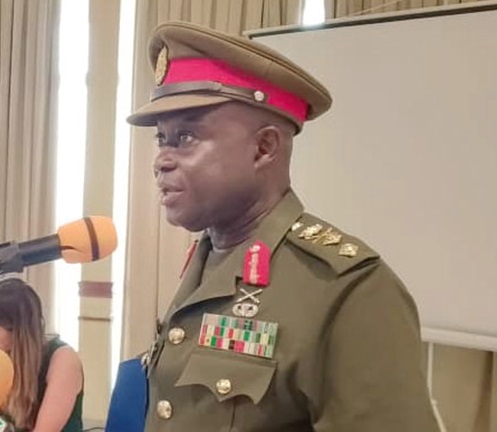
Fighting transnational organised crime requires united front - Boundary Commission boss
The Commissioner General of the Ghana Boundary Commission (GhBC), Major General Dr Emmanuel Kotia, has called for a united front to deal efficiently with increasing transnational organised crime that impacts negatively on the development of border communities within the West African sub-region.
He explained that the growing threats of transnational organised crime, illegal mining, goods smuggling and border community deprivation were undermining individual attempts to address these challenges in border regions.
Speaking at the opening of a two-day extraordinary general assembly meeting of the Black Volta Cross Border Community Region in Accra last Wednesday, Maj. Gen. Kotia stated that cross-border cooperation was no longer an option, but a necessity in today's interconnected world.
“Our borders are not barriers; they are gateways to shared growth, development and security.
“However, the increasing challenges related to transnational organised crime, illegal mining, the smuggling of goods and the deprivation of border communities, among others, that characterise our international border regions have slowed down individual efforts at curbing them. Their continuous rise requires confronting them as a united front," he said.
The meeting
The meeting, among other things, is designed to initiate Savannah Region, a new border region, into the Black Volta Cross Border Community Region (Black Volta ESCO).
It was organised by the Black Volta ESCO and GhBC with support from the German Development Agency (GIZ) and the West African Economic and Monetary Union (UEMOA).
Sixty representatives from the Black Volta ESCO member regions selected from the Upper West and Savannah regions (Ghana), Bourkani Region (Cote d’Ivoire), and South West Region (Burkina Faso) are participating in the meeting.
The Black Volta ESCO was established to create a common platform for members to coordinate their efforts in responding appropriately to shared climatic, social, economic and security problems through enhanced coordination and communication.
Commitment
Maj. Gen. Kotia said the Ghana Boundary Commission was deeply committed to ensuring the country played an active and constructive role in promoting cross-border cooperation within the ESCO Black Volta area.
“Our partnership with the governments of Côte d'Ivoire and Burkina Faso, as well as with international organisations such as GIZ and UEMOA, has been instrumental in advancing our shared goals.
"For these, I say a huge thank you to GlZ and UEMOA for your continuous support towards ensuring that boundaries in Africa transform into areas of growth and prosperity," he said.
Cooperation
The Political Officer at the German Embassy, Pauline Okkens, said cooperation and coordination were key to success in the field of
cross-border management.
She said cross-border cooperation and well-defined borders were highly relevant preventive elements against conflicts.
He said the German government, through GIZ, supported the African Union border programme, which had been an important tool in fostering cooperation and enhancing the capacities of the boundary commissions of many African countries.
"The boundary commissions play a crucial role in considering the expansion of transnational organised crime, the German government remains committed to keep on partnering through close cooperation in the field of security," she said.
The President of the Black Volta ESCO, Philip Heins, said the Savannah Region needed to be integrated with the Black Volta ESCO Community.
That, he said, would help the new region to build a close relationship with the other three-member regions to respond appropriately to climate, social, economic and security problems.
